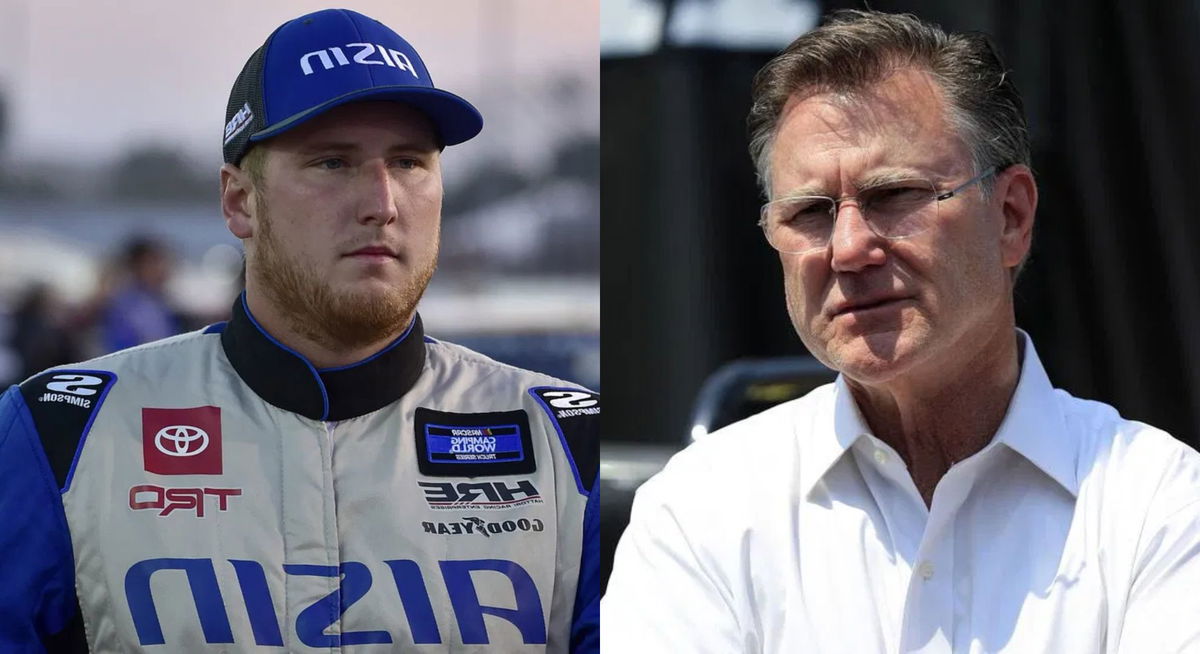

“That was violent, to be honest. That’s one of the hardest hits I’ve taken in my NASCAR career. The impact felt very similar to when I broke my back,” Aric Almirola described after being wrecked by Austin Hill in Saturday’s Xfinity Series race at Indianapolis. The crash turned heads not just because of its brutality, but also for what many immediately assumed: that it was no accident.
Watch What’s Trending Now!
With 10 laps to go at Indy, Hill got loose after contact from Almirola, then retaliated by sending Almirola into the wall with a right-rear hook, one of the sport’s most dangerous maneuvers. NASCAR officials didn’t waste time, parking Hill for five laps during the race. But the punishment didn’t stop there. What followed was a deeper review, numerous comparisons, and a decision rooted in past precedent.
NASCAR uproar forces tougher call on Austin Hill
The NASCAR community was far from quiet after Saturday’s incident at Indianapolis. Austin Hill’s retaliatory move on Aric Almirola left fans and industry insiders fuming. Social media lit up with criticism, with many arguing that Hill’s initial five-lap penalty during the race was laughably light for a move that could’ve ended someone’s season…or worse.
NASCAR seemed to agree. Eventually! By Tuesday, the penalty had been revised. Hill was handed a one-race suspension, stripped of his 21 playoff points, and will now need a waiver to remain playoff eligible. The punishment fell under Section 4.3. A and 4.4.B&D of the NASCAR Rule Book, which covers race manipulation and actions deemed detrimental to stock car racing.
NASCAR’s SVP of Competition, Elton Sawyer, later explained how the decision came together: “Once we got back to the R&D Center, we started gathering more information, talked to Austin, talked to Aric, got their input, and continued to look at all available resources through camera angles and data we could pull.”
View this post on Instagram.
That thorough review, Sawyer said, landed them in familiar territory. He was referencing two past high-profile cases: Bubba Wallace’s 2022 retaliatory wreck on Kyle Larson at Las Vegas and Chase Elliott’s intentional hook on Denny Hamlin at Charlotte in 2023. Both drivers were suspended for a race following similarly dangerous actions.
“[It] fell into a bucket very similar to what we had dealt with a year or so ago at Las Vegas with Bubba and Kyle Larson, as well as what we dealt with at Charlotte with Chase Elliot and Denny Hamlin,” Sawyer said. In 2022, NASCAR handed Bubba Wallace a one-race suspension after determining he intentionally spun Cup champion Kyle Larson at Las Vegas in a retaliatory move, followed by a physical confrontation.
Similarly, in 2023, NASCAR suspended Chase Elliott for one race after he intentionally wrecked Denny Hamlin during the Coca-Cola 600, issuing the penalty within 24 hours. The common thread? Dangerous retaliation in the heat of the moment. And as Sawyer put it, the focus had to shift from individual consequences to the bigger picture: “[It was] the right thing to do for the sport, for the garage area, and for the integrity of our sport.” In Hill’s case, the answer was clear, even if it took a little longer to get there.
Richard Childress bows to penalty decision
After days of heated debate and fan outrage, Richard Childress Racing has finally chosen not to appeal the one-race suspension handed down to Austin Hill recently. The team released a brief but pointed statement on social media confirming the decision. “We remain focused on winning a championship with Austin Hill in 2025. Austin Dillon will race the No. 21 Chevrolet at Iowa Speedway.”
But that doesn’t mean Richard Childress has softened his stance. In fact, when Hill faced criticism from veterans like Harvick before NASCAR revised its original penalty, the veteran team owner stood firmly behind his driver. He argued that the five-lap penalty initially given to Hill was already too harsh. Childress further hinted that NASCAR’s enforcement can be politically skewed.
“Hell, no,” Childress said when asked about whether Hill deserved further punishment. “They didn’t do a damn thing to the No. 2 car (Austin Cindric). He wrecked Ty (Dillon) and admitted to it, drove him in the right rear and wrecked him at COTA. It’s who you are. We’re a blue-collar team. They give us trouble all the time.”
The frustration was palpable. Childress’s comments struck a nerve with a certain section of fans who’ve long questioned how consistently NASCAR doles out discipline. Still, in the wake of further investigation and a review of footage and data, NASCAR deemed the contact between Hill and Almirola a deliberate and unsafe act.
With Austin Dillon now stepping in at Iowa, all eyes turn to what comes next. Not just for Hill, but for how NASCAR handles similar situations going forward. Has this penalty set a new standard, or will it raise more questions about favoritism and fairness in the garage?



